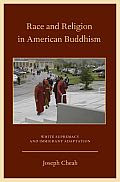For those of you who feel I should write a book, let me say that the job has already been done. Just arrived in the mail is Race and Religion in American Buddhism: White Supremacy and Immigrant Adaptation by Fr. Joseph Cheah. Below is the opening paragraph.

When the first wave of Burmese immigrant Buddhists set foot on American soil in the late 1960s, they came into contact with a variety of forms of Buddhism not found in their native Burma. One of these forms was a white or convert Buddhism, whose legacy includes the specter of an Orientalist and racist past, often hardly acknowledged, yet rarely if ever entirely absent from the discourse within Euro-American Buddhism. The legacy of Orientalism in convert Buddhism can be traced to the works of Western Orientalists in the middle and late Victorian era. Stemming in part from Orientalist racial projects, vestiges of white supremacy ideology can still be detected today in the controversy surrounding who represents “American Buddhism” and the smorgasbord of approaches in Buddhist practices that have been taken for granted in many meditation centers, hospitals, and other institutions. The prevailing ideology of white supremacy operative in these and other contexts influences the ways in which Buddhist practices have been adapted by both convert and ethnic Buddhist communities. Within the scope of Buddhism as both a religion and a practice, focusing primarily on the Theravada tradition, this book examines rearticulations of Asian Buddhist practices through the lens of race and racialization.
I can’t wait to read the whole book!